Terra Film was a Berlin-based film production company. Founded in 1919, Terra became one of the four Germany's largest film production companies in the 1930s under the Nazi regime.
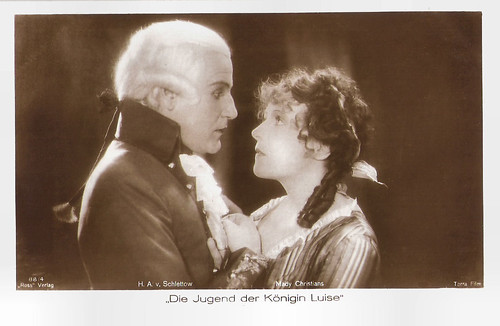
German postcard by Ross Verlag, no. 88/4. Photo: Terra Film. Publicity still for Königin Luise, 1. Teil - Die Jugend der Königin Luise/Queen Louise (Karl Grune, 1927) with Hans Adalbert Schlettow and Mady Christians.
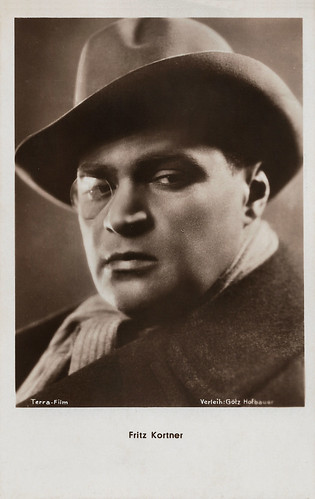
Fritz Kortner. Austrian postcard by Iris Verlag, no. 6037. Photo: Götz Hofbauer / Terra Film.
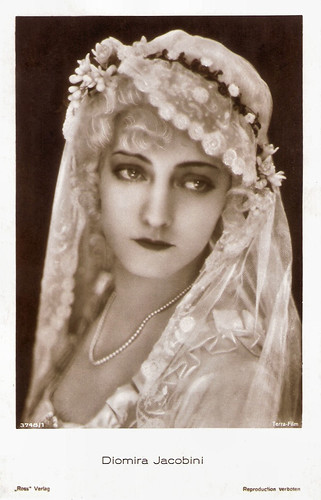
Diomira Jacobini. German postcard by Ross Verlag, no. 3748/1, 1928-1929. Photo: Terra-Film. Publicity still for Revolutionshochzeit/Revolutions Bryllup/The Last Night (A.W. Sandberg, 1928).
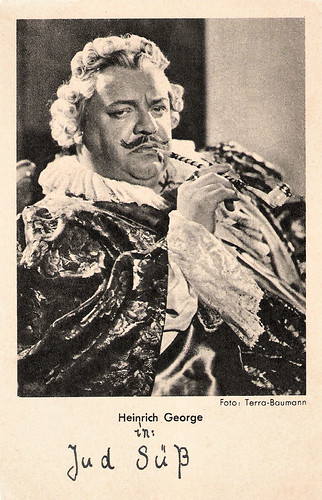
Heinrich George. German postcard by Das Programm von Heute, Berlin. Photo: Baumann / Terra. Publicity still for Jud Süss/Jew Süss (Veit Harlan, 1940).
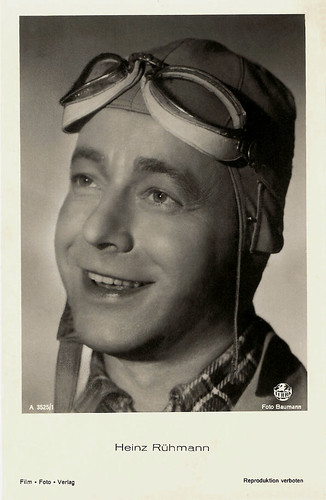
Heinz Rühmann. German postcard by Film-Foto-Verlag, no. A 3535/1, 1941-1944. Photo: Baumann / Terra. Publicity still for Quax, der Bruchpilot/Quax the Crash Pilot (Kurt Hoffmann, 1941).
Terra Film was founded at end of 1919, initially as a limited liability company and converted into a corporation in October 1920. In 1922, Terra acquired studios and reproduction facilities of Eiko-Film GmbH in Berlin-Marienfelde. For a few years, Ullstein AG and IG Farbenindustrie AG were the major shareholders with 47% and 50% of the share capital, respectively. In 1928, the latter bought the Ullstein share and became almost sole owner with 97%.
Terra's first film was Figaros Hochzeit/The Marriage of Figaro (Max Mack, 1920), starring Alexander Moissi and Hella Moja. It was followed by films such as the Science-Fiction film Die Insel der Verschollenen/The Island of the Lost (Urban Gad, 1921), a loose adaptation of H.G. Wells' 'The Island of Dr. Moreau', and the comedy Der Liebeskorridor/The love Corridor (Urban Gad, 1921) with Anton Edthofer and Adolphe Engers.
In 1927, Heinrich George starred in Bigamie/Bigamy (Jaap Speyer, 1927) as a man between two women, played by Maria Jacobini and Anita Dorris. Mady Christians starred in the two part historical epic Königin Luise/Queen Luise (Karl Grune, 1927/28).
Terra's heyday came after the switch to the talkies and under National Socialism. In 1930, the Swiss Scotoni family, headed by the influential businessman Eugen Scotoni, acquired Terra for 1.2 million Reichsmarks. Between 1930 and 1935, when Terra was gradually nationalised by the German government, Eugen's son Ralph Scotoni oversaw his family's interest in Terra Film.
A huge success was the crime film Der Mann, der den Mord beging/The Man Who Murdered (Kurt Bernhardt, 1931). Conrad Veidt stars as the Marquis de Sévigné, who is put in a difficult position when he falls for the lovely but married Lady Falkland (Trude von Molo). Her husband, the strict Lord Falkland (Heinrich George), subjects her to constant abuse... The following year a separate English version was made, Stamboul (Dimitri Buchowetzki, 1932), starring Warwick Ward, Rosita Moreno, and Margot Grahame.
In 1933, Ralph Scotoni automatically became a member of the Nazi Party (as was common for owners of large companies) but he never picked up his membership card. Many of the 40 films from the era of Ralph Scotoni were influenced by Nazi ideas. The focus was also on Swiss subjects and locations, and the similarities between Switzerland and Nazi Germany. Examples are Wilhelm Tell/William Tell (Heinz Paul, 1934), Der Springer von Pontresina/The Champion of Pontresina (Herbert Selpin, 1934) with Sepp Rist.
German-Swiss historical film Wilhelm Tell/William Tell (Heinz Paul, 1934) starred Hans Marr, Conrad Veidt and Emmy Göring. It is based on the 1804 play William Tell by Friedrich Schiller about the Swiss folk hero William Tell, a woodsman who was an expert with his crossbow. It was made by Terra Film, with a separate English-language version supervised by Manning Haynes also being released. While working on the film Veidt, who had recently given sympathetic performances of Jews in the British films The Wandering Jew (Maurice Elvey, 1933) and Jew Suss (Lothar Mendes, 1934), was detained by the German authorities. It was only after pressure from the British Foreign Office that he was eventually released.
According to Wikipedia, since the Terra films lost money, the family sold its stake in Terra in 1935. Ralph Scottoni left Germany after the nationalisation of Terra. The family continued to run a chain of cinemas in Switzerland.
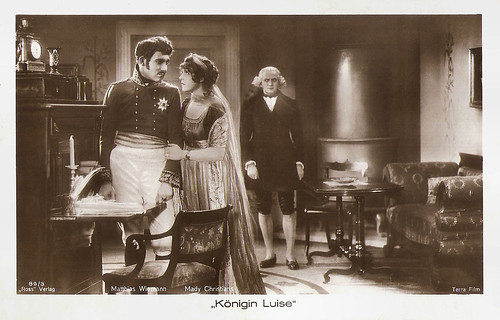
German postcard by Ross Verlag, no. 89/3, 1925-1935. Photo: Terra Film. Publicity still for Königin Luise/Queen Louise (Karl Grune, 1927) with Mady Christians and Mathias Wiemann.
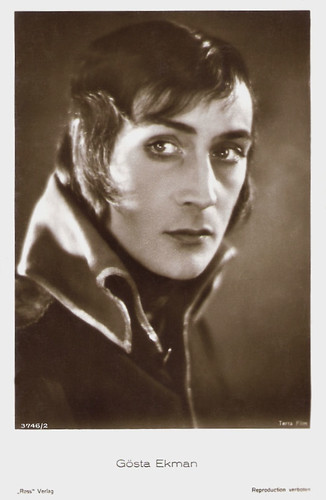
German postcard by Ross Verlag, no. 3746/2. Photo: Terra Film. Gösta Ekman in Revolutionshochzeit/Revolutions Bryllup/The Last Night (A.W. Sandberg, 1928).
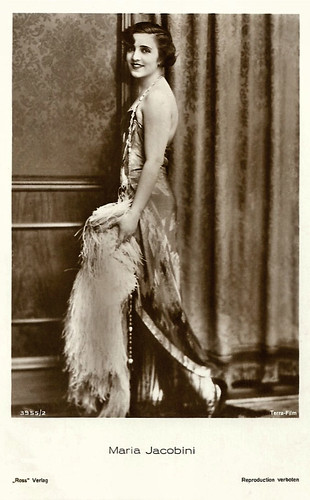
German postcard by Ross Verlag, no. 3955/2, 1928-1929. Dist.: Terra-Film. Maria Jacobini in the Italian late silent film Il carnevale di Venezia/Carnival in Venice (Mario Almirante, 1928).

Dorothea Wieck. German postcard by Ross Verlag, Berlin, no. 7771/1, 1932-1933. Photo: Klagemann / Terra.

Gustav Diessl. German postcard by Ross Verlag, no. 9795/1, 1935-1936. Photo: Bodal Film der Terra.
Between 1933 and 1944, Terra released 120 feature films, including some propaganda films. In Die Reiter von Deutsch-Ostafrika/The Riders of German East Africa (Herbert Selpin, 1934), Sepp Rist played a German farmer in German East Africa, who is conscripted into the Schutztruppe (German armed colonial force) at the beginning of the First World War. Another example is Hermine und die sieben Aufrechten/Hermione and the Seven Law (Frank Wisbar, 1935) with Heinrich George and Karin Hardt. From 1935 on, Terra produced in the Tempelhof studios of Ufa Film Art GmbH.
In the wake of the nationalisation of the film industry in July 1937, Terra-Film Art Ltd. changed its name and a majority was now owned by the state-owned company Cautio Treuhand GmbH. Terra-Film Art continued to produce Propaganda films like the war film Kameraden auf See/Comrades at Sea (Heinz Paul, 1938) starring Theodor Loos. The film is set during the Spanish Civil War, which it portrays as a Communist uprising against the lawful government.
Otto Lehmann produced for Terra the notorious propaganda film Jud Süß/Jew Süß (Veit Harlan, 1940) at the behest of Joseph Goebbels. Jud Süß/Jew Süß is considered one of the most antisemitic films of all time. Director Veit Harlan also wrote the screenplay with Eberhard Wolfgang Möller and Ludwig Metzger. The leading roles were played by Ferdinand Marian and Harlan's wife Kristina Söderbaum. Werner Krauss and Heinrich George played key supporting roles.
Jud Süß/Jew Süß has been characterised as "one of the most notorious and successful pieces of antisemitic film propaganda produced in Nazi Germany." It was a great success in Germany, and was seen by 20 million people. Although the film's budget of 2 million Reichsmarks was considered high for films of that era, the box office receipts of 6.5 million Reichsmarks made it a financial success. SS Leader Heinrich Himmler urged members of the SS and the police to watch the film.
After the war, some of the leading cast members were brought to trial as part of the denazification process. They generally defended their participation in the film on the grounds that they had only done so under duress. Despite significant evidence to support their arguments, Susan Tegel, author of 'Nazis and the Cinema', characterises their postwar attempts to distance themselves from the film as "crass and self-serving". However, she concedes that their motives for accepting the roles seem to have been more driven by opportunistic ambition than by antisemitism.
Veit Harlan was the only major film director of the Third Reich to stand trial for 'crimes against humanity'. After three trials, Harlan was given a light sentence because he convinced the courts that the antisemitic content of the film had been dictated by Goebbels and that Harlan had worked to moderate the antisemitism. Eventually, Harlan was reinstated as a citizen of the Federal Republic of Germany and went on to make nine more films. He remained a controversial figure and the target of protests.
But how bad or good is the film? I never saw it myself, but many reviews at IMDb are surprisingly positive. Karl Self: "Considering the enormous, fanatical hatred of the Nazis against Jews, the movie's antisemitism comes across as surprisingly subtle. Flanked by the occasional antisemitic outburst ("There are no hostels for Jews in Stuttgart") the movie builds a convincing psychogram of a perpetrator and leaves all its great performances to its antiheroes, while the good guys come across as pale, square and boring."
Together with the propaganda films Die Rothschilds/The Rothschilds (Erich Waschneck, 1940) and the 'documentary' Der ewige Jude/The Eternal Jew (Fritz Hippler, 1940), Jud Süß/Jew Süß (Veit Harlan, 1940) remains one of the most frequently discussed examples of the use of film to further the Nazi antisemitic agenda. In the 2000s, two documentary films and the feature Jud Süss - Film ohne Gewissen/Jew Suss: Rise and Fall (Oskar Roehler, 2010) were released that explore the history and impact of this films.
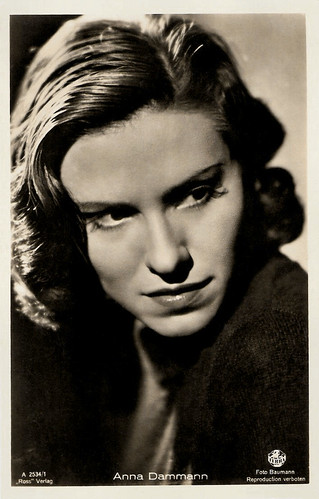
Anna Dammann. German postcard by Ross Verlag, no. A 2534/1, 1939-1940. Photo: Baumann / Terra.

Hertha Feiler. German postcard by Ross Verlag, no. A 2566/1, 1939-1940. Photo: Quick / Terra.
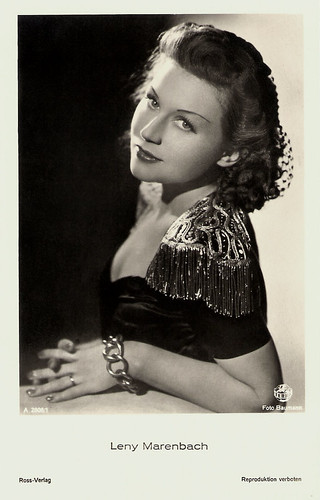
Leny Marenbach. German postcard by Ross-Verlag, no. A 2808/1, 1939-1940. Photo: Baumann / Terra.
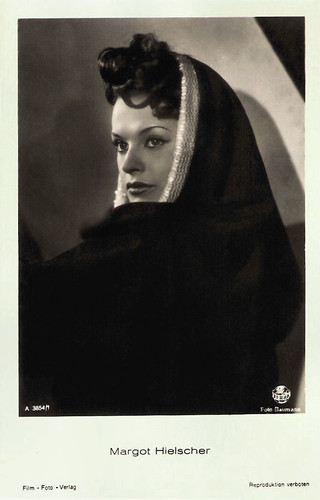
Margot Hielscher. German postcard by Film-Foto-Verlag, no. 3854/1. 1941-1944. Photo: Baumann / Terra.
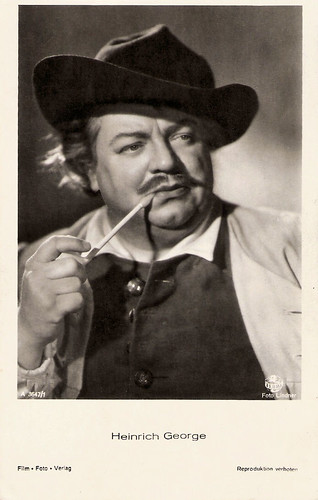
Heinrich George. German postcard by Film-Foto-Verlag, no. 3647/1, 1941-1944. Photo: Lindner / Terra. Publicity still for Andreas Schlüter (Herbert Maisch, 1942).
Otto Lehman later also produced for Terra Fronttheater/Front theatre (Arthur Maria Rabenalt, 1942), starring Heli Finkenzeller. In the film, the very successful actress Lena Andres (Finkenzeller) marries dr. Paul Meinhardt (René Deltgen). For his sake, she renounces her acting career. When Paul is drafted, she gets persuaded by director Langhammer (Lothar Firmans), with whom she shot several films, to step in for a sick colleague on a front-theater tour. Paul learns about it and retreats disappointed. Lena follows her now transferred to Greece man with the troupe of the front theater there to save their marriage. A clarifying conversation between the spouses leads to a reconciliation.
Like Lehman, several producers had their own 'production groups' at Terra. Among them were also Helmut Beck, actor-director Gustaf Gründgens, Edward Kubat, comedy star Heinz Rühmann, Viktor von Struve, EC Techow, Hans Tost and Walter Tost.
Hans Tost was one the most productive of them. He produced such films as Nanu, Sie kennen Korff noch nicht?/What, you know still don't know Korff? (Fritz Holl, 1938) with Heinz Rühmann, Wir machen Musik/We make music (Helmut Käutner, 1942) with Ilse Werner and Viktor de Kowa, and the Hans Albers hit Große Freiheit Nr. 7/Great Freedom No. 7 (Helmut Käutner, 1944), the first Agfa-colour film by the Terra. This musical drama was named after Große Freiheit, a street next to Hamburg's Reeperbahn road in the St. Pauli red light district. Große Freiheit Nr. 7 tells the story of the blond 'singing sailor' Hannes Kröger (Hans Albers) who works in a St. Pauli club - address: Große Freiheit 7 - and falls in love with a girl played by Ilse Werner. But she prefers his rival Willem (Hans Söhnker) and Hannes returns to the sea.
In 1942, Terra was absorbed into Ufa-Film GmbH (UFI) and retained only formal independence. Among Terra's directors were Boleslaw Barlog, Géza von Bolváry, Peter Paul Brauer, Erich Engels, Kurt Hoffmann, Helmut Käutner, Wolfgang Liebeneiner, Roger von Norman, Rudolf van der Noss, Heinz Paul, Arthur Maria Rabenalt, Günther Rittau, Herbert Selpin, and Hans Steinhoff.
Terra produced many successful entertainment films. A huge success was the circus drama Zirkus Renz/Circus Renz (Arthur Maria Rabenalt, 1943), starring René Deltgen, Paul Klinger and Angelika Hauff. The circus film was made as a deliberately escapist release at a time when the Second World War was starting to turn against Germany and its allies. The film takes its title from the real Circus Renz.
Heinz Rühmann made with his production group such popular comedies as Der Florentiner Hut/The Florentine hat (Wolfgang Liebeneiner, 1939), Quax, der Bruchpilot/Quax the Crash Pilot (Kurt Hoffmann, 1941), Ich vertraue Dir meine Frau an/I Entrust My Wife to You (Kurt Hoffmann, 1943), and Quax in Afrika/Quax in Africa (Helmut Weiss, 1944-1953).
His biggest success, Die Feuerzangenbowle/The Punch Bowl (Helmut Weiss, 1944) tells the story of a famous writer (Heinz Rühmann, 42 at the time) going undercover as a student at a small-town secondary school after his friends tell him that he missed out on the best part of growing up by being educated at home. The story in the book takes place during the time of the Wilhelmine Empire in Germany. The film was produced and released in Germany during the last years of World War II and still it is a favourite for many film fans. Marcus Cyron at IMDb: "Die Feuerzangenbowle is absolutely one of the Best Movies ever and the Best German Movie at all."
From the early 1960s to the 1980s, Terra-Film GmbH returned in West-Berlin and produced or co-produced more than 100 films.
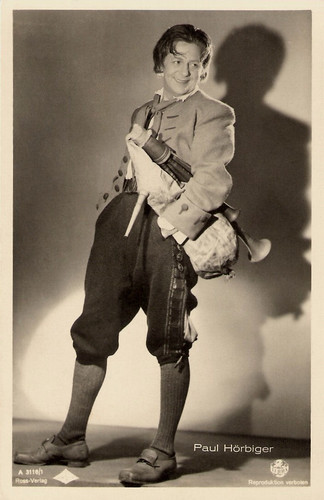
Paul Hörbiger. German postcard by Ross Verlag, no. A 3118/1, 1941-1944. Photo: Terra / Wien-Film.

Joachim Gottschalk. German postcard by Ross-Verlag, no. A 3253/1, 1941-1944. Photo: Baumann / Terra.

Dorothea Wieck. German postcard by Film-Foto-Verlag, Berlin, no. A 3628/1, 1941-1944. Photo: Baumann / Terra.
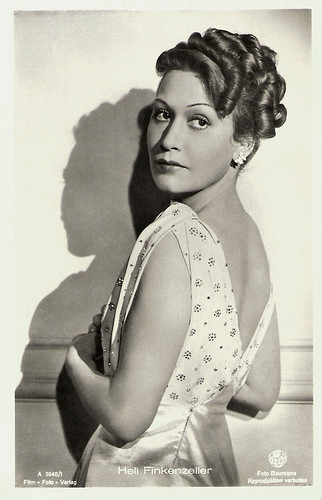
Heli Finkenzeller. German postcard by Film-Foto-Verlag, no. A 3648/1, 1941-1944. Photo: Baumann / Terra.
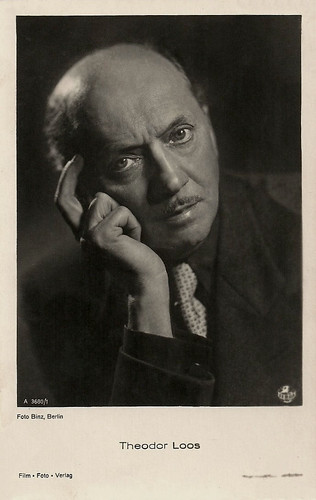
Theodor Loos. German postcard by Film-Foto-Verlag, no. A 3680/1, 1941-1944. Photo: Binz / Terra.
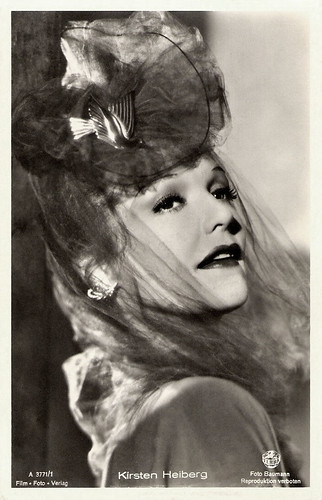
Kirsten Heiberg. German Postcard by Film-Foto-Verlag, no. A 3371/1, 1941-1944. Photo: Baumann / Terra.
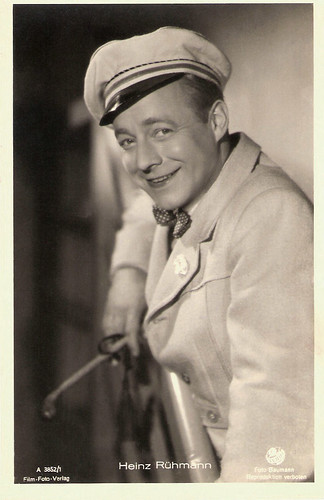
Heinz Rühmann. German postcard by Film-Foto-Verlag, no. A 3852/1, 1941-1944. Photo: Baumann / Terra.
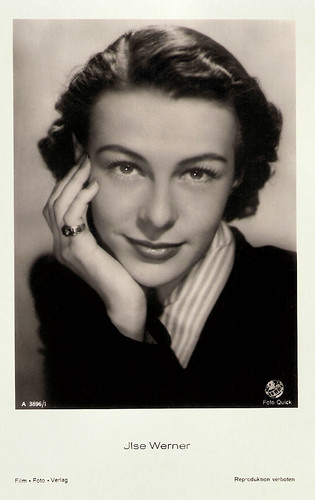
Ilse Werner. German postcard by Film-Foto-Verlag, no. A 3896/1, 1941-1944. Photo: Quick / Terra.
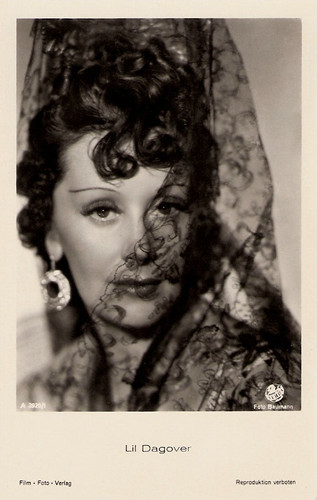
Lil Dagover. German postcard by Film-Foto-Verlag, no. A 3920/1, 1941-1944. Photo: Baumann / Terra.
Sources: Wikipedia (German and English) and IMDb.

German postcard by Ross Verlag, no. 88/4. Photo: Terra Film. Publicity still for Königin Luise, 1. Teil - Die Jugend der Königin Luise/Queen Louise (Karl Grune, 1927) with Hans Adalbert Schlettow and Mady Christians.

Fritz Kortner. Austrian postcard by Iris Verlag, no. 6037. Photo: Götz Hofbauer / Terra Film.

Diomira Jacobini. German postcard by Ross Verlag, no. 3748/1, 1928-1929. Photo: Terra-Film. Publicity still for Revolutionshochzeit/Revolutions Bryllup/The Last Night (A.W. Sandberg, 1928).

Heinrich George. German postcard by Das Programm von Heute, Berlin. Photo: Baumann / Terra. Publicity still for Jud Süss/Jew Süss (Veit Harlan, 1940).

Heinz Rühmann. German postcard by Film-Foto-Verlag, no. A 3535/1, 1941-1944. Photo: Baumann / Terra. Publicity still for Quax, der Bruchpilot/Quax the Crash Pilot (Kurt Hoffmann, 1941).
The Switch to the Talkies
Terra Film was founded at end of 1919, initially as a limited liability company and converted into a corporation in October 1920. In 1922, Terra acquired studios and reproduction facilities of Eiko-Film GmbH in Berlin-Marienfelde. For a few years, Ullstein AG and IG Farbenindustrie AG were the major shareholders with 47% and 50% of the share capital, respectively. In 1928, the latter bought the Ullstein share and became almost sole owner with 97%.
Terra's first film was Figaros Hochzeit/The Marriage of Figaro (Max Mack, 1920), starring Alexander Moissi and Hella Moja. It was followed by films such as the Science-Fiction film Die Insel der Verschollenen/The Island of the Lost (Urban Gad, 1921), a loose adaptation of H.G. Wells' 'The Island of Dr. Moreau', and the comedy Der Liebeskorridor/The love Corridor (Urban Gad, 1921) with Anton Edthofer and Adolphe Engers.
In 1927, Heinrich George starred in Bigamie/Bigamy (Jaap Speyer, 1927) as a man between two women, played by Maria Jacobini and Anita Dorris. Mady Christians starred in the two part historical epic Königin Luise/Queen Luise (Karl Grune, 1927/28).
Terra's heyday came after the switch to the talkies and under National Socialism. In 1930, the Swiss Scotoni family, headed by the influential businessman Eugen Scotoni, acquired Terra for 1.2 million Reichsmarks. Between 1930 and 1935, when Terra was gradually nationalised by the German government, Eugen's son Ralph Scotoni oversaw his family's interest in Terra Film.
A huge success was the crime film Der Mann, der den Mord beging/The Man Who Murdered (Kurt Bernhardt, 1931). Conrad Veidt stars as the Marquis de Sévigné, who is put in a difficult position when he falls for the lovely but married Lady Falkland (Trude von Molo). Her husband, the strict Lord Falkland (Heinrich George), subjects her to constant abuse... The following year a separate English version was made, Stamboul (Dimitri Buchowetzki, 1932), starring Warwick Ward, Rosita Moreno, and Margot Grahame.
In 1933, Ralph Scotoni automatically became a member of the Nazi Party (as was common for owners of large companies) but he never picked up his membership card. Many of the 40 films from the era of Ralph Scotoni were influenced by Nazi ideas. The focus was also on Swiss subjects and locations, and the similarities between Switzerland and Nazi Germany. Examples are Wilhelm Tell/William Tell (Heinz Paul, 1934), Der Springer von Pontresina/The Champion of Pontresina (Herbert Selpin, 1934) with Sepp Rist.
German-Swiss historical film Wilhelm Tell/William Tell (Heinz Paul, 1934) starred Hans Marr, Conrad Veidt and Emmy Göring. It is based on the 1804 play William Tell by Friedrich Schiller about the Swiss folk hero William Tell, a woodsman who was an expert with his crossbow. It was made by Terra Film, with a separate English-language version supervised by Manning Haynes also being released. While working on the film Veidt, who had recently given sympathetic performances of Jews in the British films The Wandering Jew (Maurice Elvey, 1933) and Jew Suss (Lothar Mendes, 1934), was detained by the German authorities. It was only after pressure from the British Foreign Office that he was eventually released.
According to Wikipedia, since the Terra films lost money, the family sold its stake in Terra in 1935. Ralph Scottoni left Germany after the nationalisation of Terra. The family continued to run a chain of cinemas in Switzerland.

German postcard by Ross Verlag, no. 89/3, 1925-1935. Photo: Terra Film. Publicity still for Königin Luise/Queen Louise (Karl Grune, 1927) with Mady Christians and Mathias Wiemann.

German postcard by Ross Verlag, no. 3746/2. Photo: Terra Film. Gösta Ekman in Revolutionshochzeit/Revolutions Bryllup/The Last Night (A.W. Sandberg, 1928).

German postcard by Ross Verlag, no. 3955/2, 1928-1929. Dist.: Terra-Film. Maria Jacobini in the Italian late silent film Il carnevale di Venezia/Carnival in Venice (Mario Almirante, 1928).

Dorothea Wieck. German postcard by Ross Verlag, Berlin, no. 7771/1, 1932-1933. Photo: Klagemann / Terra.

Gustav Diessl. German postcard by Ross Verlag, no. 9795/1, 1935-1936. Photo: Bodal Film der Terra.
Propaganda
Between 1933 and 1944, Terra released 120 feature films, including some propaganda films. In Die Reiter von Deutsch-Ostafrika/The Riders of German East Africa (Herbert Selpin, 1934), Sepp Rist played a German farmer in German East Africa, who is conscripted into the Schutztruppe (German armed colonial force) at the beginning of the First World War. Another example is Hermine und die sieben Aufrechten/Hermione and the Seven Law (Frank Wisbar, 1935) with Heinrich George and Karin Hardt. From 1935 on, Terra produced in the Tempelhof studios of Ufa Film Art GmbH.
In the wake of the nationalisation of the film industry in July 1937, Terra-Film Art Ltd. changed its name and a majority was now owned by the state-owned company Cautio Treuhand GmbH. Terra-Film Art continued to produce Propaganda films like the war film Kameraden auf See/Comrades at Sea (Heinz Paul, 1938) starring Theodor Loos. The film is set during the Spanish Civil War, which it portrays as a Communist uprising against the lawful government.
Otto Lehmann produced for Terra the notorious propaganda film Jud Süß/Jew Süß (Veit Harlan, 1940) at the behest of Joseph Goebbels. Jud Süß/Jew Süß is considered one of the most antisemitic films of all time. Director Veit Harlan also wrote the screenplay with Eberhard Wolfgang Möller and Ludwig Metzger. The leading roles were played by Ferdinand Marian and Harlan's wife Kristina Söderbaum. Werner Krauss and Heinrich George played key supporting roles.
Jud Süß/Jew Süß has been characterised as "one of the most notorious and successful pieces of antisemitic film propaganda produced in Nazi Germany." It was a great success in Germany, and was seen by 20 million people. Although the film's budget of 2 million Reichsmarks was considered high for films of that era, the box office receipts of 6.5 million Reichsmarks made it a financial success. SS Leader Heinrich Himmler urged members of the SS and the police to watch the film.
After the war, some of the leading cast members were brought to trial as part of the denazification process. They generally defended their participation in the film on the grounds that they had only done so under duress. Despite significant evidence to support their arguments, Susan Tegel, author of 'Nazis and the Cinema', characterises their postwar attempts to distance themselves from the film as "crass and self-serving". However, she concedes that their motives for accepting the roles seem to have been more driven by opportunistic ambition than by antisemitism.
Veit Harlan was the only major film director of the Third Reich to stand trial for 'crimes against humanity'. After three trials, Harlan was given a light sentence because he convinced the courts that the antisemitic content of the film had been dictated by Goebbels and that Harlan had worked to moderate the antisemitism. Eventually, Harlan was reinstated as a citizen of the Federal Republic of Germany and went on to make nine more films. He remained a controversial figure and the target of protests.
But how bad or good is the film? I never saw it myself, but many reviews at IMDb are surprisingly positive. Karl Self: "Considering the enormous, fanatical hatred of the Nazis against Jews, the movie's antisemitism comes across as surprisingly subtle. Flanked by the occasional antisemitic outburst ("There are no hostels for Jews in Stuttgart") the movie builds a convincing psychogram of a perpetrator and leaves all its great performances to its antiheroes, while the good guys come across as pale, square and boring."
Together with the propaganda films Die Rothschilds/The Rothschilds (Erich Waschneck, 1940) and the 'documentary' Der ewige Jude/The Eternal Jew (Fritz Hippler, 1940), Jud Süß/Jew Süß (Veit Harlan, 1940) remains one of the most frequently discussed examples of the use of film to further the Nazi antisemitic agenda. In the 2000s, two documentary films and the feature Jud Süss - Film ohne Gewissen/Jew Suss: Rise and Fall (Oskar Roehler, 2010) were released that explore the history and impact of this films.

Anna Dammann. German postcard by Ross Verlag, no. A 2534/1, 1939-1940. Photo: Baumann / Terra.

Hertha Feiler. German postcard by Ross Verlag, no. A 2566/1, 1939-1940. Photo: Quick / Terra.

Leny Marenbach. German postcard by Ross-Verlag, no. A 2808/1, 1939-1940. Photo: Baumann / Terra.

Margot Hielscher. German postcard by Film-Foto-Verlag, no. 3854/1. 1941-1944. Photo: Baumann / Terra.

Heinrich George. German postcard by Film-Foto-Verlag, no. 3647/1, 1941-1944. Photo: Lindner / Terra. Publicity still for Andreas Schlüter (Herbert Maisch, 1942).
Absolutely One of the Best Movies Ever
Otto Lehman later also produced for Terra Fronttheater/Front theatre (Arthur Maria Rabenalt, 1942), starring Heli Finkenzeller. In the film, the very successful actress Lena Andres (Finkenzeller) marries dr. Paul Meinhardt (René Deltgen). For his sake, she renounces her acting career. When Paul is drafted, she gets persuaded by director Langhammer (Lothar Firmans), with whom she shot several films, to step in for a sick colleague on a front-theater tour. Paul learns about it and retreats disappointed. Lena follows her now transferred to Greece man with the troupe of the front theater there to save their marriage. A clarifying conversation between the spouses leads to a reconciliation.
Like Lehman, several producers had their own 'production groups' at Terra. Among them were also Helmut Beck, actor-director Gustaf Gründgens, Edward Kubat, comedy star Heinz Rühmann, Viktor von Struve, EC Techow, Hans Tost and Walter Tost.
Hans Tost was one the most productive of them. He produced such films as Nanu, Sie kennen Korff noch nicht?/What, you know still don't know Korff? (Fritz Holl, 1938) with Heinz Rühmann, Wir machen Musik/We make music (Helmut Käutner, 1942) with Ilse Werner and Viktor de Kowa, and the Hans Albers hit Große Freiheit Nr. 7/Great Freedom No. 7 (Helmut Käutner, 1944), the first Agfa-colour film by the Terra. This musical drama was named after Große Freiheit, a street next to Hamburg's Reeperbahn road in the St. Pauli red light district. Große Freiheit Nr. 7 tells the story of the blond 'singing sailor' Hannes Kröger (Hans Albers) who works in a St. Pauli club - address: Große Freiheit 7 - and falls in love with a girl played by Ilse Werner. But she prefers his rival Willem (Hans Söhnker) and Hannes returns to the sea.
In 1942, Terra was absorbed into Ufa-Film GmbH (UFI) and retained only formal independence. Among Terra's directors were Boleslaw Barlog, Géza von Bolváry, Peter Paul Brauer, Erich Engels, Kurt Hoffmann, Helmut Käutner, Wolfgang Liebeneiner, Roger von Norman, Rudolf van der Noss, Heinz Paul, Arthur Maria Rabenalt, Günther Rittau, Herbert Selpin, and Hans Steinhoff.
Terra produced many successful entertainment films. A huge success was the circus drama Zirkus Renz/Circus Renz (Arthur Maria Rabenalt, 1943), starring René Deltgen, Paul Klinger and Angelika Hauff. The circus film was made as a deliberately escapist release at a time when the Second World War was starting to turn against Germany and its allies. The film takes its title from the real Circus Renz.
Heinz Rühmann made with his production group such popular comedies as Der Florentiner Hut/The Florentine hat (Wolfgang Liebeneiner, 1939), Quax, der Bruchpilot/Quax the Crash Pilot (Kurt Hoffmann, 1941), Ich vertraue Dir meine Frau an/I Entrust My Wife to You (Kurt Hoffmann, 1943), and Quax in Afrika/Quax in Africa (Helmut Weiss, 1944-1953).
His biggest success, Die Feuerzangenbowle/The Punch Bowl (Helmut Weiss, 1944) tells the story of a famous writer (Heinz Rühmann, 42 at the time) going undercover as a student at a small-town secondary school after his friends tell him that he missed out on the best part of growing up by being educated at home. The story in the book takes place during the time of the Wilhelmine Empire in Germany. The film was produced and released in Germany during the last years of World War II and still it is a favourite for many film fans. Marcus Cyron at IMDb: "Die Feuerzangenbowle is absolutely one of the Best Movies ever and the Best German Movie at all."
From the early 1960s to the 1980s, Terra-Film GmbH returned in West-Berlin and produced or co-produced more than 100 films.

Paul Hörbiger. German postcard by Ross Verlag, no. A 3118/1, 1941-1944. Photo: Terra / Wien-Film.

Joachim Gottschalk. German postcard by Ross-Verlag, no. A 3253/1, 1941-1944. Photo: Baumann / Terra.

Dorothea Wieck. German postcard by Film-Foto-Verlag, Berlin, no. A 3628/1, 1941-1944. Photo: Baumann / Terra.

Heli Finkenzeller. German postcard by Film-Foto-Verlag, no. A 3648/1, 1941-1944. Photo: Baumann / Terra.

Theodor Loos. German postcard by Film-Foto-Verlag, no. A 3680/1, 1941-1944. Photo: Binz / Terra.

Kirsten Heiberg. German Postcard by Film-Foto-Verlag, no. A 3371/1, 1941-1944. Photo: Baumann / Terra.

Heinz Rühmann. German postcard by Film-Foto-Verlag, no. A 3852/1, 1941-1944. Photo: Baumann / Terra.

Ilse Werner. German postcard by Film-Foto-Verlag, no. A 3896/1, 1941-1944. Photo: Quick / Terra.

Lil Dagover. German postcard by Film-Foto-Verlag, no. A 3920/1, 1941-1944. Photo: Baumann / Terra.
Sources: Wikipedia (German and English) and IMDb.
No comments:
Post a Comment